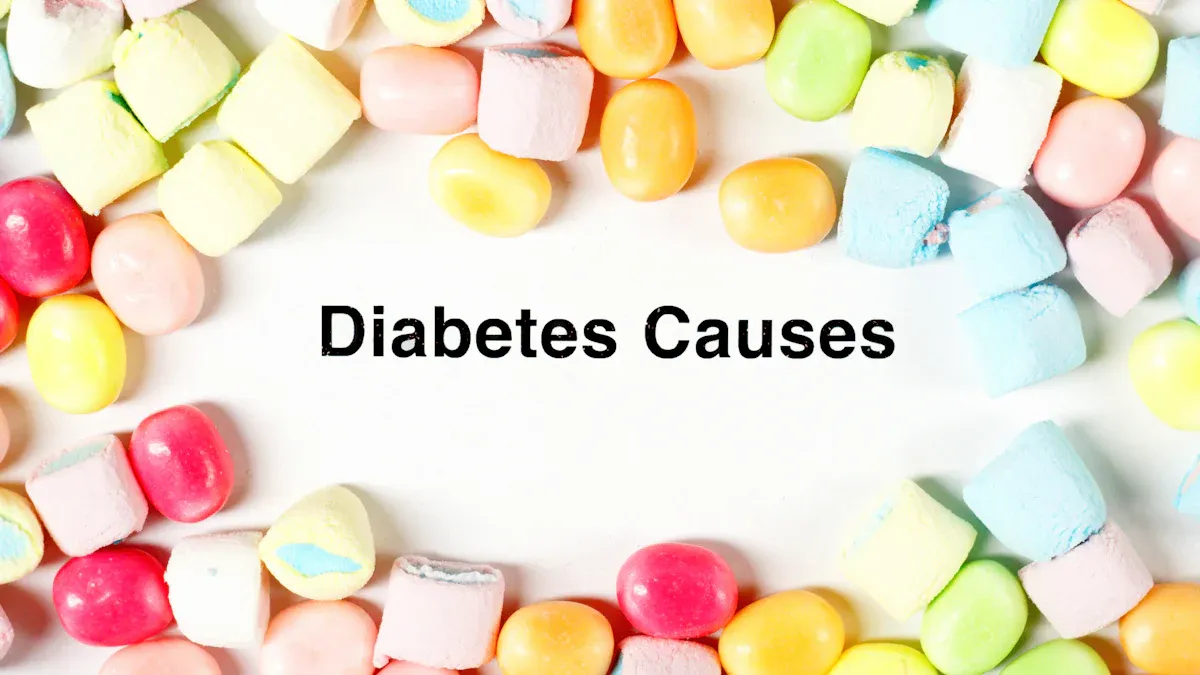
Certain foods can set off chronic inflammation in your body. You need to know which foods put your health at risk so you can make smarter choices every day. Many adults, especially those in minority and low socioeconomic groups, experience ongoing inflammation that can lead to serious health problems.
Here are some foods that scientific studies have linked to chronic inflammation:
Food Type | Inflammatory Effect |
|---|---|
Highly processed foods | Trigger chronic inflammation |
Sugars | Cause your body to release inflammatory messengers called cytokines |
Saturated fats | Worsen inflammation in fat tissue |
Gluten | Can cause inflammation if you have a sensitivity |
Dairy | Effects are mixed in scientific studies |
Knowing what to avoid helps you protect your long-term health.
Key Takeaways
Certain foods, like processed meats and added sugars, can trigger chronic inflammation in your body.
Chronic inflammation can lead to serious health issues, including heart disease and diabetes, so it’s important to recognize its symptoms.
Making simple dietary swaps, such as choosing whole grains over refined carbs, can help reduce inflammation.
Incorporating anti-inflammatory foods like fruits, vegetables, and healthy fats can improve your overall health.
Being aware of your food choices empowers you to make healthier decisions that support long-term well-being.
Chronic Inflammation Overview
Definition
You may hear the term chronic inflammation often, but what does it mean? Chronic inflammation is a long-lasting response from your immune system. Unlike the quick reaction you get from a cut or infection, this type of inflammation sticks around for months or even years. Your body keeps sending out signals called proinflammatory cytokines, which can damage tissues and slow down healing. Chronic inflammation usually starts as a low-grade, silent process. You might not notice any symptoms at first.
Chronic inflammation is different from acute inflammation. Acute inflammation helps you heal after an injury or infection. Chronic inflammation keeps your immune system active for too long, which can harm healthy cells.
Here’s a quick comparison:
Feature | Acute Inflammation | Chronic Inflammation |
|---|---|---|
Duration | Hours to days | Months to years |
Symptoms | Pain, redness, swelling | Fatigue, muscle aches, brain fog |
Causes | Injury, infection | Autoimmune disease, obesity |
Health Impacts | Heals quickly | Linked to serious diseases |
Why It Matters
Chronic inflammation matters because it can affect your whole body. You may feel tired, have muscle aches, or notice changes in your weight. Sometimes, you get headaches or stomach problems. Chronic inflammation can also cause joint pain, skin rashes, and even mood changes like depression or anxiety.
Common symptoms include:
Fatigue
Joint pain or stiffness
Gastrointestinal issues
Skin problems
Frequent infections
If you ignore chronic inflammation, you risk developing serious health problems. Doctors link it to heart disease, diabetes, and other long-term conditions. You need to pay attention to these signs so you can protect your health.
Foods Linked to Chronic Inflammation

Refined Carbohydrates
Refined carbohydrates are found in foods like white bread, pastries, and many breakfast cereals. When you eat these foods, your blood sugar rises quickly. This spike causes your body to release more insulin, which can lead to a pro-inflammatory state. Over time, eating too many refined carbs can increase the production of reactive oxygen species (ROS). These molecules activate pathways in your body that release inflammatory messengers, such as IL-6 and TNF-α. Refined carbohydrates also change the balance of bacteria in your gut, making it easier for inflammation to spread throughout your body.
Refined carbohydrates can:
Cause high blood sugar and insulin levels.
Produce ROS, which trigger inflammation.
Change gut bacteria, leading to more inflammation.
Processed Meats
Processed meats include foods like hot dogs, bacon, sausage, and deli meats. These meats often contain preservatives, salt, and other additives. Eating processed meats has been linked to higher levels of inflammatory markers in the blood, such as CRP and leptin. Studies show that people who eat more processed meats tend to have more signs of inflammation, especially those who are overweight or obese. Regular consumption of these foods can make chronic inflammation worse and increase your risk for health problems.
Processed meats can:
Raise levels of inflammatory markers in your body.
Increase your risk for diseases linked to inflammation.
Added Sugars
Added sugars are found in candy, baked goods, sweetened yogurt, and many packaged foods. When you eat too much sugar, your body releases pro-inflammatory cytokines. These are chemicals that trigger inflammation and can damage tissues over time. High sugar intake is also linked to metabolic problems, which can make chronic inflammation worse. Eating a lot of added sugar can lead to long-term health issues, including autoimmune diseases.
Mechanism | Description |
|---|---|
Pro-inflammatory cytokines | Excessive sugar intake leads to the release of cytokines that trigger inflammation. |
Metabolic disorders | High sugar consumption is linked to metabolic issues that promote inflammation. |
Chronic low-grade inflammation | Increased sugar intake is associated with chronic inflammation, which can lead to various diseases. |
Fried Foods
Fried foods, such as French fries, fried chicken, and doughnuts, are high in unhealthy fats and often cooked at very high temperatures. These foods contain saturated and trans fats, which can change the balance of fatty acids in your body and promote inflammation. Fried foods also contain advanced glycation end products (AGEs), which form when food is cooked at high heat. AGEs can cause oxidative stress and trigger chronic inflammation.
Fried foods can:
Contain unhealthy fats that promote inflammation.
Have AGEs that increase oxidative stress in your body.
Trans Fats
Trans fats are found in many processed foods, including margarine, packaged snacks, and baked goods. These fats are created during food processing and are known to be harmful. Trans fats can change the way your cells work and activate pathways that lead to inflammation. Studies show that people who eat more trans fats have higher levels of inflammatory markers, such as C-reactive protein (CRP) and interleukin 6. Trans fats also increase the risk of heart disease by damaging blood vessels.
Trans fats can:
Increase inflammatory markers in your blood.
Harm your blood vessels and raise your risk for heart disease.
Highly Processed Foods
Highly processed foods include chips, packaged snacks, instant noodles, and frozen meals. These foods often contain high levels of sugar, unhealthy fats, and additives. Research shows that eating a diet high in processed foods is linked to higher levels of inflammation in the body. For example, eating a sausage, egg, and cheese sandwich can cause a much higher inflammatory response than eating oatmeal and fruit. Western diets that include many processed foods are associated with increased levels of inflammatory markers like CRP and IL-6.
Tip: Choose whole foods over highly processed options to help reduce inflammation.
Excessive Alcohol
Drinking too much alcohol can harm your body in many ways. When your body breaks down alcohol, it creates byproducts that can damage cells and trigger inflammation. Alcohol also disrupts the balance of bacteria in your gut, making it easier for inflammation to spread. Chronic alcohol use can weaken your immune system and make it harder for your body to control inflammation.
Mechanism | Description |
|---|---|
Alcohol metabolism | Produces reactive byproducts that trigger immune responses and inflammation. |
Cell damage | Damages liver cells, releasing substances that activate inflammation. |
Fatty acid dysregulation | Disrupts fatty acid metabolism, increasing pro-inflammatory chemicals. |
Impaired detoxification | Reduces the liver’s ability to remove toxins, leading to more inflammation. |
Refined Grains
Refined grains are found in foods like white rice, white pasta, and many baked goods. These grains have had most of their fiber and nutrients removed. Diets high in refined grains are linked to higher levels of inflammatory proteins in the blood. People who eat more refined grains also have a higher risk of diseases like type 2 diabetes and heart disease. Some studies show conflicting results, but most agree that eating fewer refined grains can help lower inflammation.
Evidence Type | Description |
|---|---|
Association with Diseases | Refined grain intakes are part of dietary patterns positively associated with the risk of type 2 diabetes and cardiovascular disease. |
Inflammatory Proteins | Refined grain intakes are positively associated with inflammatory protein concentrations in human plasma. |
Conflicting Data | Limited and conflicting data exist regarding the specific relationships between refined grain intakes and plasma inflammatory protein concentrations. |
Sugary Drinks
Sugary drinks include soda, sweetened teas, sports drinks, and energy drinks. These beverages are a major source of added sugar in many diets. Drinking sugary beverages raises your blood sugar quickly and can lead to higher levels of inflammation. Studies show that people who drink more sugary drinks have higher levels of C-reactive protein (CRP), a marker of chronic inflammation. Cutting back on these drinks can help lower inflammation and improve your health.
Study Year | Findings | Inflammatory Marker |
|---|---|---|
2018 | Higher sugar intake linked to chronic inflammation | C-reactive protein (CRP) |
2014 | Reduced sugar-sweetened drink intake led to lower inflammation | Inflammatory factors in blood |
Drinking more sugary drinks is linked to:
Higher CRP levels.
Increased waist size.
Lower good cholesterol (HDL).
Red Meat
Red meat includes beef, pork, and lamb. Some studies suggest that eating a lot of red meat may increase inflammation, especially if you are overweight. However, the link between red meat and chronic inflammation is not as clear as with other foods. Some research shows that body weight may play a bigger role than red meat itself. More studies are needed to understand this connection fully.
Evidence Description | Findings |
|---|---|
Analysis of plasma markers | Measuring plasma markers helps track diet and disease risk associations. |
Association with body weight | Red meat intake was not directly linked to inflammation after adjusting for body weight. |
Need for randomized trials | More research is needed to understand the relationship between red meat and inflammation. |
Health Risks

Disease Risk
Chronic Inflammation puts you at risk for many serious diseases. When your immune system stays active for too long, it can damage your arteries and lead to plaque buildup. This damage increases your chance of heart attacks and strokes. You also face a higher risk for type 2 diabetes because inflammation in fat tissue causes problems with blood sugar and weight gain. Some cancers, such as colorectal cancer, can develop from long-term inflammation in your intestines. Autoimmune diseases, gastrointestinal disorders, and neurodegenerative conditions like Alzheimer’s disease are also linked to ongoing inflammation.
Chronic Disease Type | Connection to Inflammation |
|---|---|
Cardiovascular Disease | Plaque buildup and blood clots |
Type 2 Diabetes | Inflammation in fat tissue |
Cancer | Higher risk for colorectal cancer |
Autoimmune Disorders | Inflammation is a key feature |
Gastrointestinal Disorders | Chronic intestinal inflammation |
Neurodegenerative Diseases | Inflammation contributes to brain changes |
You can lower your risk for these diseases by choosing foods that reduce inflammation.
Daily Impact
You may notice changes in your daily life when chronic inflammation affects your body. You might feel tired even after a good night’s sleep. Your muscles and joints can ache, making it hard to stay active. Some people experience skin problems or stomach issues. Chronic inflammation can also slow your thinking and make it harder to remember things. You may struggle to concentrate or feel mentally exhausted. These symptoms can make school, work, and social activities more difficult.
Common daily effects include:
Fatigue and low energy
Muscle and joint pain
Difficulty concentrating
Memory problems
Mood changes
If you pay attention to these signs, you can take steps to improve your health and well-being.
Anti-Inflammatory Alternatives
Fruits & Vegetables
You can choose fruits and vegetables that fight inflammation. Berries, such as strawberries and blueberries, contain powerful antioxidants called anthocyanins. Apples help lower your risk of heart disease. Cherries may ease pain after exercise. Citrus fruits like oranges and grapefruits provide vitamin C and other anti-inflammatory compounds. Cruciferous vegetables, including broccoli, cauliflower, and kale, support your immune system. Leafy greens like spinach and arugula also help reduce inflammation.
Try adding a mix of these fruits and vegetables to your meals for better health.
Examples of anti-inflammatory produce:
Apples
Berries
Cherries
Citrus fruits
Broccoli
Cauliflower
Kale
Spinach
Tomatoes
Whole Grains
Whole grains give you fiber and nutrients that help lower inflammation. You can eat foods made from intact, ground, or flaked grains. Quinoa, buckwheat, and amaranth are also good choices. Studies show that whole grains can reduce markers of inflammation in your body.
Whole grain options:
Oats
Brown rice
Quinoa
Buckwheat
Whole wheat bread
Healthy Fats
Healthy fats protect your cells and lower inflammation. Omega-3 fatty acids, found in fatty fish and some seeds, are especially helpful. Linoleic acid, found in vegetable oils, also supports a healthy inflammatory response.
Sources of healthy fats:
Salmon
Sardines
Walnuts
Flaxseeds
Olive oil
Lean Proteins
Lean proteins help your body repair and stay strong. Poultry, fish, legumes, and low-fat dairy are good choices. Fatty fish like salmon contain omega-3s that fight inflammation. Soya products, such as tofu, have phytoestrogens that lower inflammatory markers.
Lean protein choices:
Chicken breast
Salmon
Tofu
Lentils
Low-fat yogurt
Simple Swaps
You can make easy changes to your diet to lower inflammation.
Instead of… | Try… |
|---|---|
Plain bagel with cream cheese | Whole-grain toast with olive oil |
Soda | Green tea |
Corn muffin | Unsalted mixed nuts and an apple |
Steak and baked potato | Salmon with broccoli |
Cake | Fruit salad with berries |
Small swaps can make a big difference in your health. Choose foods that support your body and help you feel your best.
You protect your health when you avoid foods that trigger chronic inflammation. Choosing anti-inflammatory options like leafy greens, whole grains, and healthy fats can quickly lower inflammation markers such as IL-6 and C-reactive protein.
You may see improvements in blood sugar, heart health, and even mental clarity.
Small changes, like swapping soda for green tea or adding beans to meals, help you build lasting habits.
Education about food choices empowers you to make decisions that support a longer, healthier life.
FAQ
What are the top foods that cause chronic inflammation?
You find the biggest offenders in processed meats, refined carbohydrates, sugary drinks, fried foods, and trans fats. These foods trigger your immune system and keep inflammation active.
What symptoms might you notice if you eat inflammatory foods?
You may feel tired, have joint pain, or notice stomach problems. Some people get headaches or skin issues. Chronic inflammation can also affect your mood and memory.
What simple swaps help you avoid inflammatory foods?
You can choose whole grains instead of white bread. Pick fruit over candy. Drink water or green tea instead of soda. Try salmon or beans instead of red meat.
What drinks should you avoid to lower inflammation?
You should skip soda, sweetened teas, energy drinks, and sports drinks. These drinks contain added sugars that raise inflammation markers in your body.
What foods can you eat to fight inflammation?
You can eat berries, leafy greens, whole grains, nuts, and fatty fish. These foods contain nutrients and antioxidants that help your body reduce inflammation.


